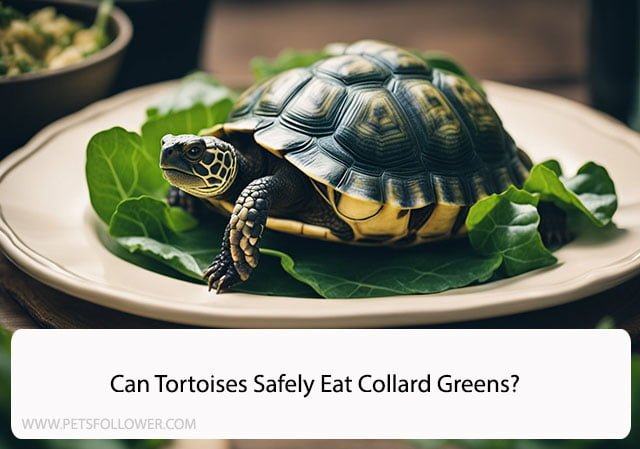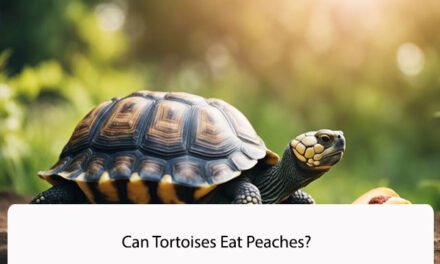Tortoises are herbivores and require a diet that is rich in fiber, vitamins, and minerals. Collard greens are a popular vegetable that many people enjoy, but can tortoises eat collard greens? The answer is yes, tortoises can eat collard greens, but there are some things to keep in mind.
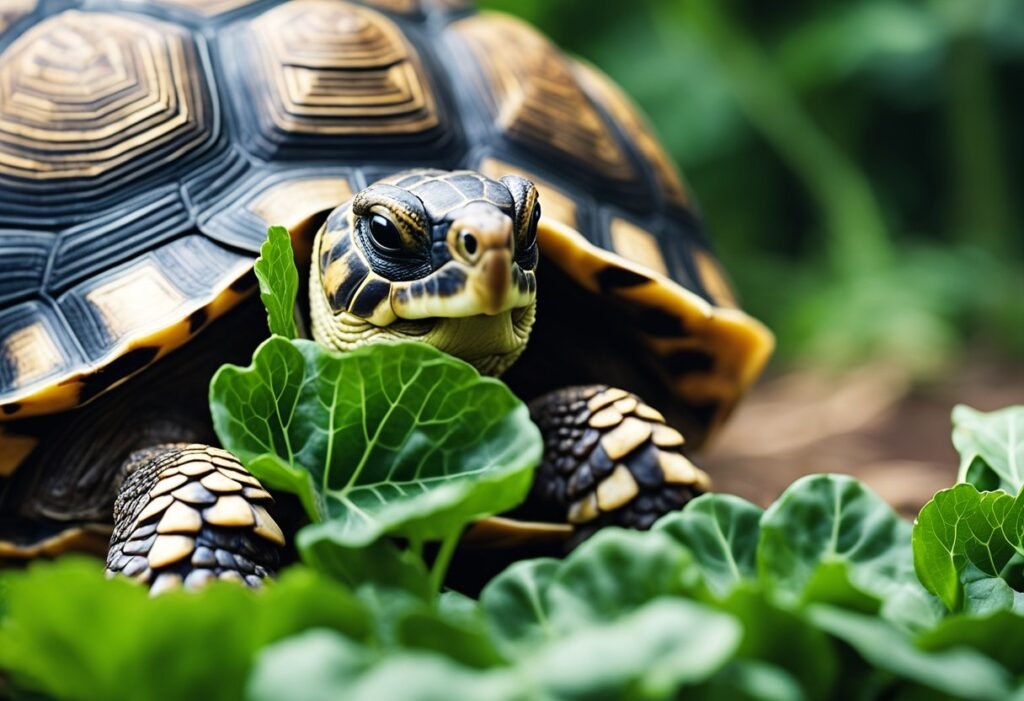
Collard greens are a good source of calcium, which is important for tortoises to maintain strong bones and a healthy shell. However, they also contain high levels of oxalic acid, which can bind to calcium and prevent its absorption. This means that collard greens should be fed in moderation and should not be the main staple of a tortoise’s diet. Additionally, it is important to wash collard greens thoroughly to remove any pesticides or other harmful chemicals that may be present.
Overall, collard greens can be a healthy addition to a tortoise’s diet, but should be fed in moderation and as part of a balanced diet that includes a variety of other vegetables and leafy greens. As with any new food, it is important to introduce collard greens slowly and monitor your tortoise’s behavior and digestion to ensure that they are tolerating it well.
Understanding Tortoise Diet
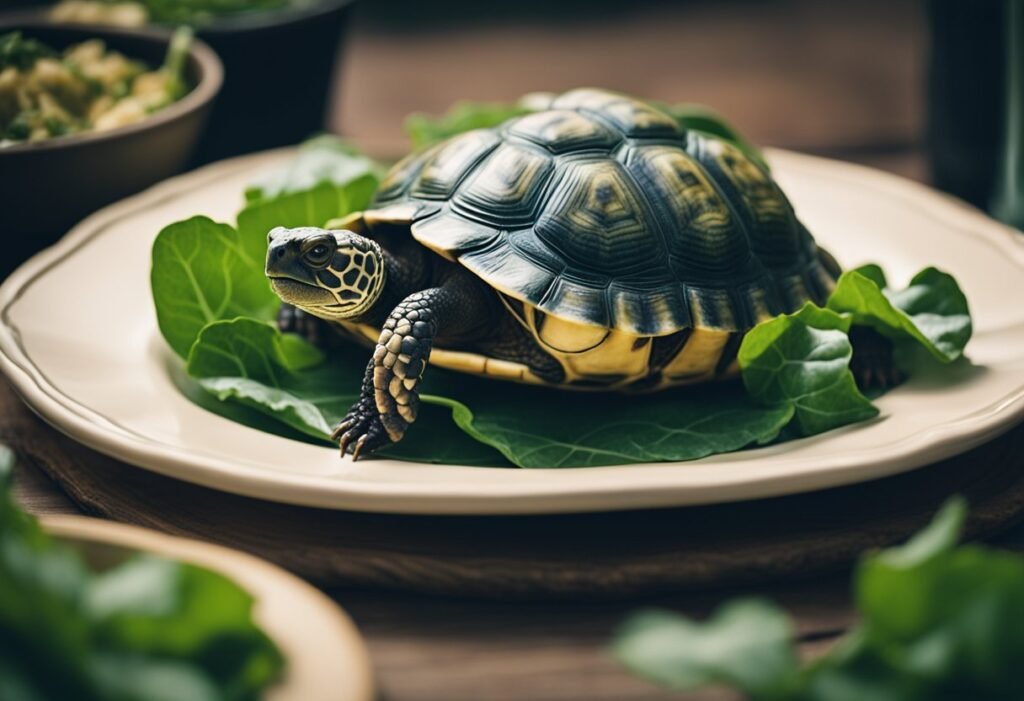
When it comes to tortoise diet, it is important to understand that different species have different dietary requirements. However, most tortoises are herbivores and require a diet that is high in fiber and low in protein.
A tortoise’s diet should consist of a variety of vegetables, fruits, and leafy greens. Some good options for vegetables include carrots, squash, and sweet potatoes. Fruits like apples, strawberries, and bananas can also be included in their diet.
Leafy greens are an essential part of a tortoise’s diet. Collard greens are a good option as they are high in calcium and vitamin A. However, it is important to note that collard greens should not be the only leafy green in a tortoise’s diet. Other options include kale, dandelion greens, and mustard greens.
It is important to avoid feeding tortoises certain foods such as iceberg lettuce, spinach, and broccoli as they can cause health issues. Additionally, fruits should be given in moderation as they are high in sugar and can lead to obesity if overfed.
Overall, it is important to provide a balanced and varied diet for your tortoise to ensure they receive all the necessary nutrients for their health and well-being.
Collard Greens and Tortoises

When it comes to feeding your tortoise, it is essential to ensure that they are getting a balanced diet. Collard greens are a nutritious food that can be included in your tortoise’s diet.
Collard greens are a great source of calcium, which is essential for healthy bones and shell development in tortoises. They are also rich in vitamins A and C, which help boost the immune system and promote healthy eyesight.
However, it is important to note that collard greens should not be the only food in your tortoise’s diet. Tortoises require a varied diet that includes a mix of vegetables, fruits, and protein sources.
When feeding collard greens, it is important to wash them thoroughly to remove any pesticides or dirt. You can also chop them into small pieces to make them easier for your tortoise to eat.
In conclusion, collard greens can be a healthy addition to your tortoise’s diet, but they should not be the only food your tortoise eats. Make sure to provide a varied diet to ensure your tortoise gets all the nutrients they need to stay healthy.
Health Benefits of Collard Greens for Tortoises
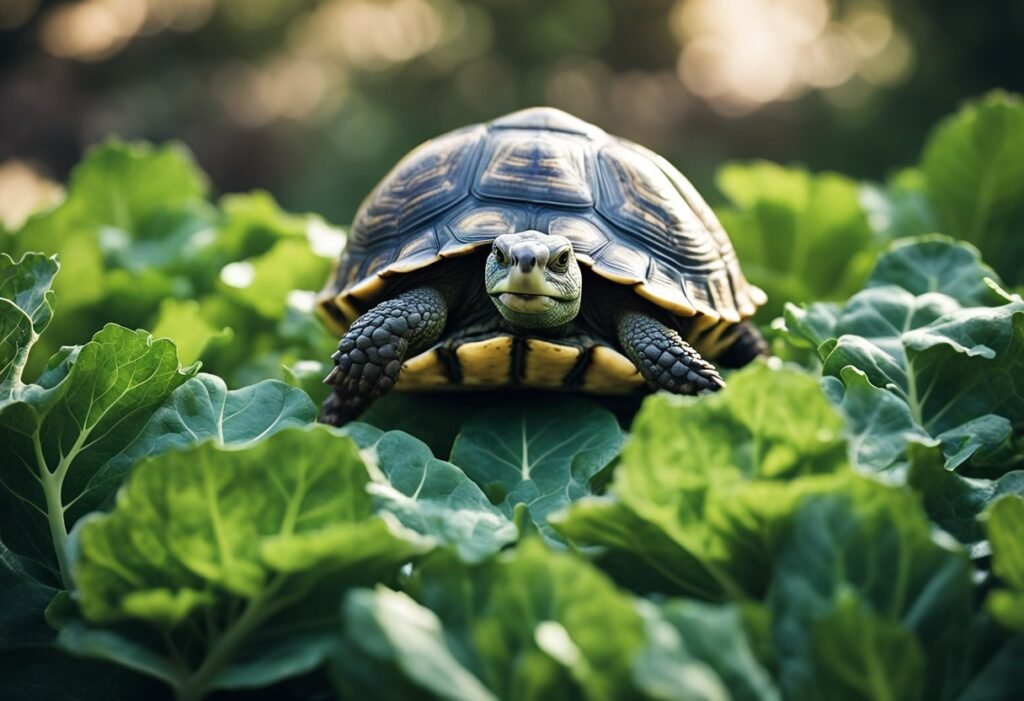
Collard greens are an excellent source of nutrition for tortoises. They are low in calories and high in fiber, making them a great addition to a tortoise’s diet. Here are some of the health benefits of collard greens for tortoises:
- Vitamin A: Collard greens are rich in vitamin A, which is essential for maintaining healthy eyesight, skin, and immune system in tortoises.
- Calcium: Tortoises need calcium to maintain strong bones and shell. Collard greens are a good source of calcium, making them an important part of a tortoise’s diet.
- Fiber: Collard greens are high in fiber, which helps keep a tortoise’s digestive system healthy and functioning properly.
- Antioxidants: Collard greens contain antioxidants, which can help protect a tortoise’s cells from damage caused by free radicals.
It’s important to note that while collard greens are a nutritious food for tortoises, they should not be the only food in their diet. A balanced diet for a tortoise should include a variety of vegetables, fruits, and protein sources. Additionally, it’s important to feed tortoises collard greens in moderation, as too much of any one food can lead to health problems.
Potential Risks of Collard Greens for Tortoises
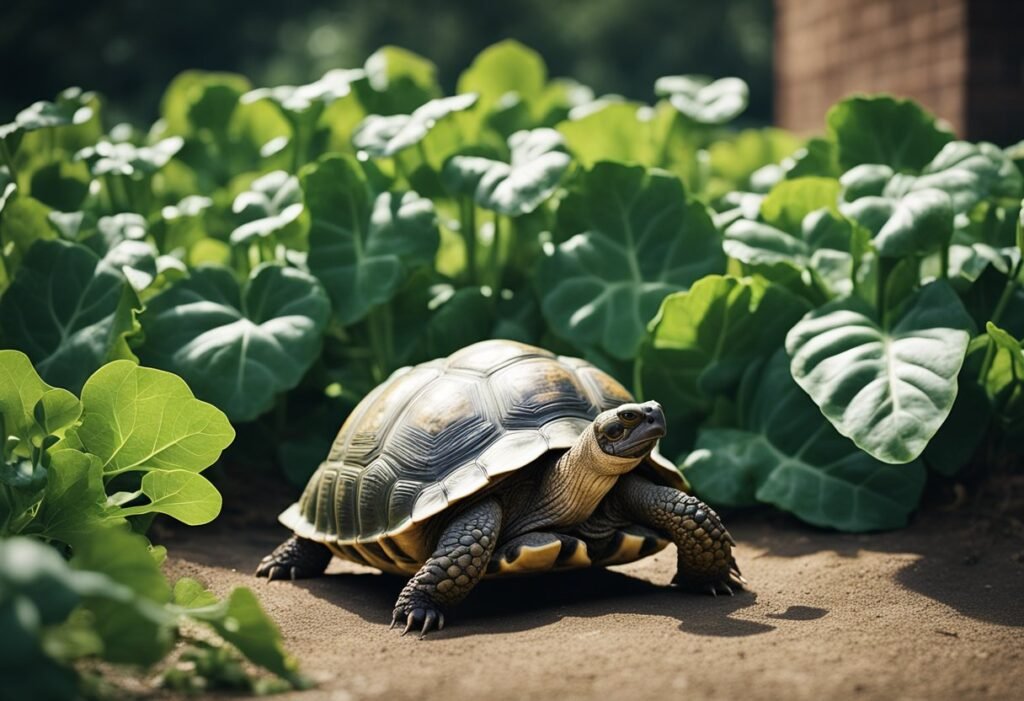
Collard greens are a nutritious vegetable that humans often consume, but can tortoises eat collard greens? While collard greens can be a healthy addition to a tortoise’s diet, there are also potential risks to consider.
One risk is that collard greens, like other leafy greens, contain oxalates. Oxalates can bind to calcium in the tortoise’s body and prevent the absorption of this important mineral. This can lead to metabolic bone disease, which can cause deformities in the tortoise’s bones and shell.
Another risk is that collard greens can be high in goitrogens. Goitrogens can interfere with the thyroid gland’s function and lead to goiter, a condition where the thyroid gland becomes enlarged. This can cause breathing difficulties and other health problems for the tortoise.
It’s also important to note that collard greens, like other leafy greens, can be high in fiber. While fiber is important for digestive health, too much fiber can cause digestive issues such as diarrhea in tortoises.
Therefore, while collard greens can be a nutritious addition to a tortoise’s diet, it’s important to feed them in moderation and to balance them with other foods that provide calcium and other essential nutrients.
How to Feed Collard Greens to Tortoises
When feeding collard greens to tortoises, it is important to make sure that they are fresh and free from any pesticides or chemicals. Here are some tips on how to feed collard greens to your tortoise:
- Wash the collard greens thoroughly before feeding them to your tortoise.
- Cut the collard greens into small bite-sized pieces to make it easier for your tortoise to eat.
- Offer collard greens in moderation as it is high in oxalates, which can bind calcium and cause health issues in tortoises.
- Rotate collard greens with other leafy greens to provide a balanced diet for your tortoise.
It is also important to note that not all tortoises will enjoy collard greens. If your tortoise does not seem interested in eating collard greens, try offering other leafy greens such as kale or dandelion greens.
Overall, collard greens can be a healthy addition to your tortoise’s diet if offered in moderation and in combination with other leafy greens.
Alternatives to Collard Greens for Tortoises
If you’re looking for alternative greens to feed your tortoise, there are plenty of options to choose from. Here are a few:
- Dandelion Greens: These are a great alternative to collard greens. They are high in calcium, phosphorus, and vitamin A. They also contain antioxidants and can help with digestion.
- Endive: Endive is another good option. It’s high in fiber and contains vitamins A and K. It’s also low in oxalates, which can be harmful to tortoises.
- Romaine Lettuce: Romaine lettuce is a good source of vitamin A and fiber. It’s also low in oxalates and can be a good alternative to collard greens.
- Kale: Kale is another leafy green that can be fed to tortoises. It’s high in calcium and vitamin A, but it’s also high in oxalates, so it should be fed in moderation.
- Mustard Greens: Mustard greens are high in calcium, vitamin A, and fiber. They also contain antioxidants and can help with digestion.
Remember, variety is key when it comes to feeding your tortoise. Make sure to offer a mix of different greens to ensure that your tortoise is getting all the nutrients they need.
Conclusion
In conclusion, collard greens are a healthy and nutritious food option for tortoises when fed in moderation. They are a good source of vitamins and minerals, including calcium, which is important for maintaining healthy bones and shells.
However, it is important to note that collard greens should not be the only food item in a tortoise’s diet. A varied diet that includes a mix of vegetables, fruits, and other plant-based foods is essential for providing tortoises with a balanced and healthy diet.
Additionally, it is important to ensure that the collard greens are fresh and free from pesticides or other harmful chemicals. If possible, organic collard greens are the best option.
Overall, if you are looking to provide your tortoise with a healthy and nutritious diet, collard greens can be a great addition to their diet. Just be sure to feed them in moderation and as part of a balanced diet.
Frequently Asked Questions

What vegetables are safe for tortoises to eat?
Tortoises are herbivores, and they require a diet that is high in fiber and low in protein. Some safe vegetables for tortoises to eat include dark leafy greens like collard greens, kale, and spinach, as well as carrots, bell peppers, and squash.
Can tortoises eat collard greens raw or cooked?
Yes, tortoises can eat collard greens both raw and cooked. However, it’s important to note that cooking the greens can remove some of the nutrients, so it’s best to offer a variety of both raw and cooked vegetables to ensure a balanced diet.
What are the best greens for tortoises to eat?
The best greens for tortoises to eat are those that are high in fiber and low in protein. Some examples include collard greens, kale, dandelion greens, mustard greens, and turnip greens. It’s important to offer a variety of greens to ensure a balanced diet.
What are some fruits that are safe for sulcata tortoises?
Some safe fruits for sulcata tortoises include apples, bananas, berries, melons, and papayas. However, fruits should only be offered in moderation as they are high in sugar.
What should be avoided in a tortoise’s diet?
Tortoises should avoid foods that are high in protein, such as meat, dairy, and eggs. They should also avoid foods that are high in fat, such as avocado, and foods that are high in oxalates, such as spinach and beet greens.
What do baby sulcata tortoises eat?
Baby sulcata tortoises should be fed a diet that is high in fiber and low in protein. Some safe foods include finely chopped greens, such as collard greens and dandelion greens, as well as small amounts of fruits and vegetables. It’s important to offer a variety of foods to ensure a balanced diet.

